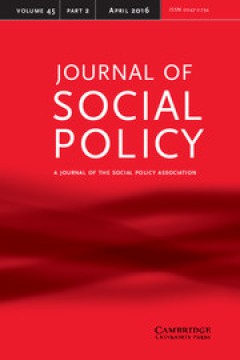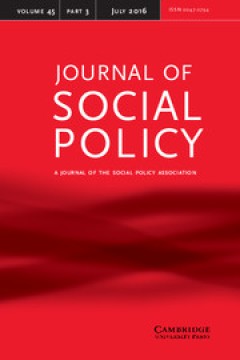Filter by

Are you really Financially Excluded if you Choose not to be Included? Insight…
Around one in five people in developed countries are ‘financially excluded’. But how meaningful is this when the current definition does not differentiate between those who choose to be excluded and those who are forced to be? This conceptual paper draws on frameworks from social exclusion, resilience and ecological systems theory to critique the current definition of financial exclusion and to…
- Edition
- Volume 45 - Issue 2 - April 2016, pp. 269-286
- ISBN/ISSN
- 0047-2794
- Collation
- -
- Series Title
- Journal of Social Policy
- Call Number
- -

The Social Construction of Retirement and Evolving Policy Discourse of Workin…
This article is concerned with the evolving social construction of older workers and retirement. Evolving and competing ‘world-views’ from public policy, and social advocacy of productive and vulnerable older workers, are described and critiqued. Contradictions and disjunctions, in terms of public policies aimed at changing employer behaviour towards older workers, are identified. It is argued …
- Edition
- Volume 45 - Issue 2 - April 2016, pp. 251-268
- ISBN/ISSN
- 0047-2794
- Collation
- -
- Series Title
- Journal of Social Policy
- Call Number
- -

Who are Non-Resident Fathers?: A British Socio-Demographic Profile
Despite international growth of, and policy interest in, divorce and separation since the 1970s, there is still surprisingly little known about non-residential fatherhood. This paper presents a ‘father-centric’ analysis and provides one of the first profiles of non-residential fatherhood in early millennium UK. Using data from Understanding Society Wave 1, a nationally representative survey of …
- Edition
- Volume 45 - Issue 2 - April 2016, pp. 223-250
- ISBN/ISSN
- 0047-2794
- Collation
- -
- Series Title
- Journal of Social Policy
- Call Number
- -

Getting Citizens to Save: Media Influence on Incentive-Based Policies
Governments often introduce financial incentives to citizens in order to encourage ‘personally responsible’ behaviour. Examples of these types of incentives include tax-deferral or tax-free incentives around retirement savings. These types of incentives are shown to matter to investment strategies in the aggregate, but we still lack a full explanation as to how individuals respond to these type…
- Edition
- Volume 45 - Issue 2 - April 2016, pp. 201-222
- ISBN/ISSN
- 0047-2794
- Collation
- -
- Series Title
- Journal of Social Policy
- Call Number
- -

The stigma of claiming benefits: a quantitative study
Stigma has long been viewed by some as essential to discourage excessive claims, yet seen by others as a cause of non-take-up by people in need and as a form of symbolic violence. More recently, there has been a resurgence of interest in the links between shame and poverty (including the role of benefits), and particular concerns about media/political rhetoric in the UK. Yet while our knowledge…
- Edition
- Volume 45 - Issue 2 - April 2016, pp. 181-199
- ISBN/ISSN
- 0047-2794
- Collation
- -
- Series Title
- Journal of Social Policy
- Call Number
- -

Journal of Social Policy, Volume 45, Issue 3 - July 2016
- Edition
- -
- ISBN/ISSN
- 0047-2794
- Collation
- -
- Series Title
- -
- Call Number
- -
- Edition
- -
- ISBN/ISSN
- 0047-2794
- Collation
- -
- Series Title
- -
- Call Number
- -

Journal of Social Policy, Volume 45, Issue 2 - April 2016
- Edition
- -
- ISBN/ISSN
- 0047-2794
- Collation
- -
- Series Title
- -
- Call Number
- -
- Edition
- -
- ISBN/ISSN
- 0047-2794
- Collation
- -
- Series Title
- -
- Call Number
- -

Shattering the silence: The power of Purposeful Storytelling in challenging s…
This article reports on a pioneering engagement project between team members from the Poverty and Social Exclusion in the UK (PSE UK) study, the Community Foundation for Northern Ireland and marginalised communities, located in areas of high deprivation in Northern Ireland. Community conversations and a tailor-made methodology of ‘Purposeful Digital Storytelling’ to capture and share data, enge…
- Edition
- Volume 36, Number 1, February 2016 p. 124-141
- ISBN/ISSN
- 02610183
- Collation
- -
- Series Title
- Critical Social Policy
- Call Number
- -

Risking peace in the ‘war against the poor’? Social exclusion and the leg…
Discourses around poverty, dependency and austerity take a particular form regarding Northern Ireland which is seen as ripe for economic ‘rebalancing’ and public sector reduction. The Welfare Reform Act 2012 is pivotal in that it provides the muscle for disciplining claimants for a low-waged, flexible labour market. But the Northern Ireland Assembly has not passed the Act or agreed a budget and…
- Edition
- Volume 36, Number 1, February 2016 p. 104-123
- ISBN/ISSN
- 02610183
- Collation
- -
- Series Title
- Critical Social Policy
- Call Number
- -

The parenting and economising practices of lone parents: Policy and evidence
UK governments have historically viewed lone parents as a political and social problem. This article argues that present-day political discourse increasingly positions lone parents as deficient parents, suggesting that they are more likely to fail to engage with good parenting practices than parents in couple households and may lack the resource management skills of successful families. We crit…
- Edition
- Volume 36, Number 1, February 2016 p. 62-81
- ISBN/ISSN
- 02610183
- Collation
- -
- Series Title
- Critical Social Policy
- Call Number
- -

Exclusionary employment in Britain’s broken labour market
There is growing evidence of the problematic nature of the UK’s ‘flexible labour market’ with rising levels of in-work poverty and insecurity. Yet successive governments have stressed that paid work is the route to inclusion, focussing attention on the divide between employed and unemployed. Past efforts to measure social exclusion have tended to make the same distinction. The aim of this artic…
- Edition
- Volume 36, Number 1, February 2016 p. 82-103
- ISBN/ISSN
- 02610183
- Collation
- -
- Series Title
- Critical Social Policy
- Call Number
- -

Child poverty in the UK: Measures, prevalence and intra-household sharing
There is cross-party agreement on the urgency of addressing child poverty in the UK, but less consensus on how to define and measure it, and understand its causes and effects. The Conservative/Liberal Coalition government’s policy and rhetoric favoured individual explanations for poverty, portraying poor parents as making bad spending decisions, and transmitting their attitudes and behaviours o…
- Edition
- Volume 36, Number 1, February 2016 p. 38-61
- ISBN/ISSN
- 02610183
- Collation
- -
- Series Title
- Critical Social Policy
- Call Number
- -

Navigating the stigmatised identities of poverty in austere times: Resisting …
Behavioural explanations of poverty and disadvantage have figured heavily in political rhetoric in the era of austerity, as a means to understand trajectories into poverty and subsequent relationships between benefit claimants and the state. These discourses are not restricted to political debate, as previous studies demonstrate they impact upon public consciousness and structure the ways that …
- Edition
- Volume 36, Number 1, February 2016 p. 21-37
- ISBN/ISSN
- 02610183
- Collation
- -
- Series Title
- Critical Social Policy
- Call Number
- -

Policies and discourses of poverty during a time of recession and austerity
This article introduces this themed issue which challenges government policies and discourses using evidence from the UK 2012 Poverty and Social Exclusion Study. Policies and discourses prioritising the role of individual deficiencies and highlighting the structural problems of the welfare state in poverty causation are nothing new. However, they re-emerged vigorously in the UK following the 20…
- Edition
- Volume 36, Number 1, February 2016 p. 3-20
- ISBN/ISSN
- 02610183
- Collation
- -
- Series Title
- Critical Social Policy
- Call Number
- -

Social Inequalities, Empowerment, and Women’s Transitions into Abusive Marr…
Extant sociological theories of gendered power within marriage focus on how social forces—such as gender inequality—shape women’s power within already established partnerships and subsequently affect their risk of intimate partner violence. Yet, inequitable social forces similarly shape women’s life conditions prior to and during the marital transition, with implications for women’s power in ma…
- Edition
- Volume 30, Number 4, August 2016 p. 670-694
- ISBN/ISSN
- 08912432
- Collation
- -
- Series Title
- Gender & Society
- Call Number
- -

The Gender Pray Gap: Wage Labor and the Religiosity of High-Earning Women and…
Social scientists agree that women are generally more religious than men, but disagree about whether the differences are universal or contingent on social context. This study uses General Social Survey data to explore differences in religiosity between, as well as among, women and men by level of individual earned income. Extending previous research, I focus on high earners with other groups in…
- Edition
- Volume 30, Number 4, August 2016 p. 643-669
- ISBN/ISSN
- 08912432
- Collation
- -
- Series Title
- Gender & Society
- Call Number
- -

Men Wanted: Heterosexual Aesthetic Labor in the Masculinization of the Hair S…
This article builds heterosexuality into the concept of aesthetic labor to better understand corporate efforts to construct gendered brands and consumer identities. By theorizing heterosexual aesthetic labor, I show how two men’s salons, Adonis and The Executive, hire for, develop, and mobilize the sexual identities and gender habitus of straight and conventionally feminine women to masculinize…
- Edition
- Volume 30, Number 4, August 2016 p. 618-642
- ISBN/ISSN
- 08912432
- Collation
- -
- Series Title
- Gender & Society
- Call Number
- -

Masculinity and the Stalled Revolution: How Gender Ideologies and Norms Shape…
Extant research suggests that supportive work–family policies promote gender equality in the workplace and in the household. Yet, evidence indicates that these policies generally have stronger effects on women’s preferences and behaviors than men’s. In this article, we draw on survey-experimental data to examine how young, unmarried men’s gender ideologies and perceptions of normative masculini…
- Edition
- Volume 30, Number 4, August 2016 p. 590-617
- ISBN/ISSN
- 08912432
- Collation
- -
- Series Title
- Gender & Society
- Call Number
- -

Gender-Based Violence Against Men and Boys in Darfur: The Gender-Genocide Nexus
Analyses of gender-based violence during mass conflict have typically focused on violence committed against women. Violence perpetrated against men has only recently been examined as gender-based violence in its own right. Using narratives from 1,136 Darfuri refugees, we analyze patterns of gender-based violence perpetrated against men and boys during the genocide in Darfur. We examine how this…
- Edition
- Volume 30, Number 4, August 2016 p. 565-589
- ISBN/ISSN
- 08912432
- Collation
- -
- Series Title
- Gender & Society
- Call Number
- -

Explaining Transatlantic Policy Divergence: The Role of Domestic Politics and…
In this study, we seek to explain a growing divergence between the US and EU regulatory policies over nanotechnology environmental, health, and safety risks. Faced with significant scientific and regulatory uncertainties, incremental approaches have been taken in both regulatory systems, but substantial differences are evident in terms of both policy processes and stringency. While the EU exhib…
- Edition
- Volume 16, Number 1, February 2016, p. 79–98.
- ISBN/ISSN
- 1526-3800
- Collation
- -
- Series Title
- Global Environmental Politics
- Call Number
- -
 Computer Science, Information & General Works
Computer Science, Information & General Works  Philosophy & Psychology
Philosophy & Psychology  Religion
Religion  Social Sciences
Social Sciences  Language
Language  Pure Science
Pure Science  Applied Sciences
Applied Sciences  Art & Recreation
Art & Recreation  Literature
Literature  History & Geography
History & Geography